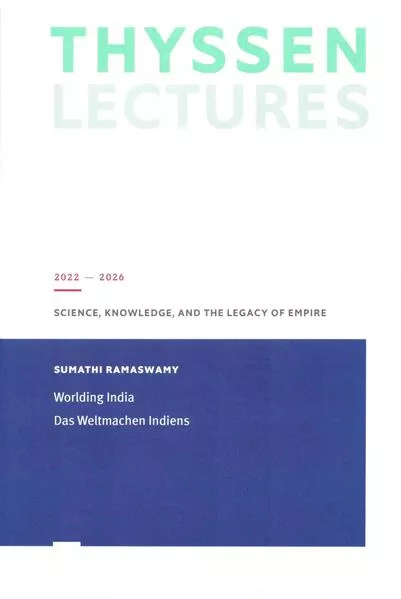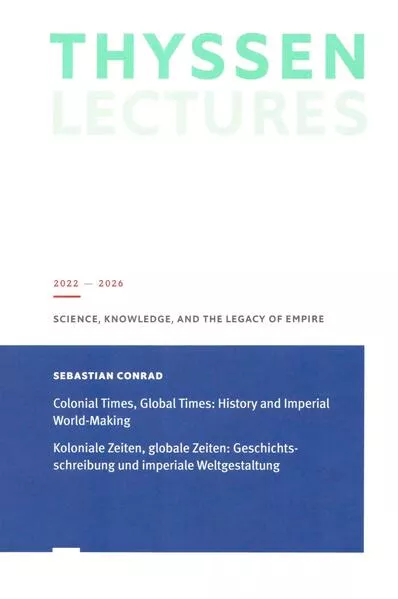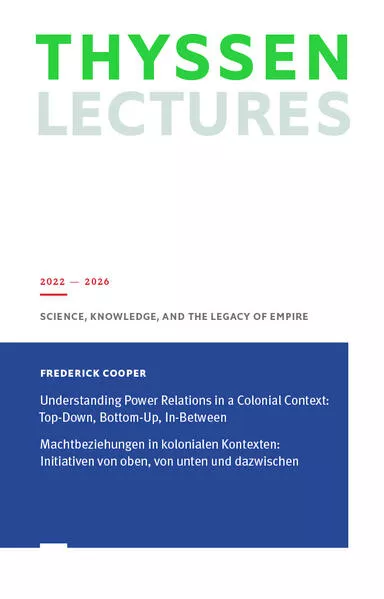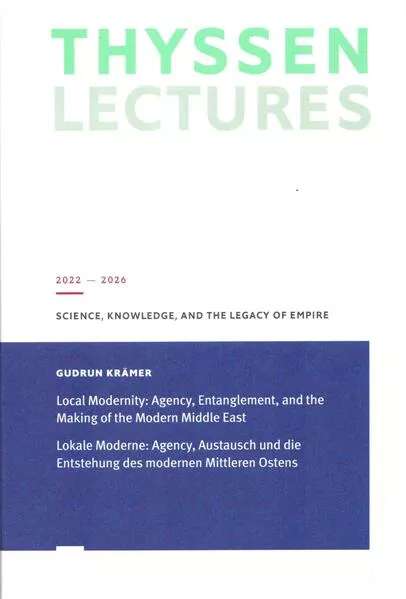Science, Knowledge, and the Legacy of Empire - Thyssen Lectues 2022-2026
Das Weltmachen Indiens
Chronologie aller Bände (1 - 4)
Die Reihenfolge beginnt mit dem Buch "Das Weltmachen Indiens". Wer alle Bücher der Reihe nach lesen möchte, sollte mit diesem Band von Sumathi Ramaswamy beginnen. Der zweite Teil der Reihe "Koloniale Zeiten, Globale Zeiten: Geschichtsschreibung und imperiale Weltgestaltung" ist am 10.10.2023 erschienen. Die Reihe umfasst derzeit 4 Bände. Der neueste Band trägt den Titel "Lokale Moderne: Agency, Austausch und die Entstehung des modernen Mittleren Ostens".
- Anzahl der Bewertungen für die gesamte Reihe: 0
- Ø Bewertung der Reihe: 0
- Start der Reihe: 09.05.2023
- Neueste Folge: 17.04.2025
Diese Reihenfolge enthält 4 unterschiedliche Autoren.
- Autor: Ramaswamy, Sumathi
- Anzahl Bewertungen: 0
- Ø Bewertung:
- Medium: Buch
- Veröffentlicht: 09.05.2023
- Genre: Politik
Das Weltmachen Indiens
Zweisprachige Ausgabe / Englisch - Deutsch
The "Thyssen Lectures" are a continuation of a tradition that the Fritz Thyssen Foundation initiated in 1979, first at various institutions throughout Germany, and then at several universities in Czechia, Israel, the Russian Federation, Turkey, and most recently Greece. The series in the United Kingdom and Ireland will be held ove a period of four years. Spearheaded by Prof. Christina von Hodenberg, director of the German Historical Insitute London, it will be dedicated to the overarching theme of "Science, Knowledge, and the Legacy of Empire".
Worlding India
Sumathi Ramaswamy's lecture focuses on a range of modern disciplinary formations known generally as earth sciences - especially geography and cartography - and explores how these sciences "worlded" one specific location on the earth's surface, "India", as a knowable, calculable, intelligible, and masterable place over the course of two centuries of British colonial rule. The lecture goes beyond the processes of imperial world-making: using three examples, Ramaswamy shows how the people of India responded to and engaged with such processes in very different ways, and very often on their own terms. Following Dipesh Chakrabaty, she demonstrates that for worldmaking projects in colonial and postcolonial India, the empire's gift of science is indispensable but inadequate.
The "Thyssen Lectures" are a continuation of a tradition that the Fritz Thyssen Foundation initiated in 1979, first at various institutions throughout Germany, and then at several universities in Czechia, Israel, the Russian Federation, Turkey, and most recently Greece. The series in the United Kingdom and Ireland will be held ove a period of four years. Spearheaded by Prof. Christina von Hodenberg, director of the German Historical Insitute London, it will be dedicated to the overarching theme of "Science, Knowledge, and the Legacy of Empire".
Worlding India
Sumathi Ramaswamy's lecture focuses on a range of modern disciplinary formations known generally as earth sciences - especially geography and cartography - and explores how these sciences "worlded" one specific location on the earth's surface, "India", as a knowable, calculable, intelligible, and masterable place over the course of two centuries of British colonial rule. The lecture goes beyond the processes of imperial world-making: using three examples, Ramaswamy shows how the people of India responded to and engaged with such processes in very different ways, and very often on their own terms. Following Dipesh Chakrabaty, she demonstrates that for worldmaking projects in colonial and postcolonial India, the empire's gift of science is indispensable but inadequate.
- Autor: Conrad, Sebastian
- Anzahl Bewertungen: 0
- Ø Bewertung:
- Medium: Buch
- Veröffentlicht: 10.10.2023
- Genre: Politik
Koloniale Zeiten, Globale Zeiten: Geschichtsschreibung und imperiale Weltgestaltung
Zweisprachige Ausgabe / Englisch - Deutsch
The "Thyssen Lectures" are a continuation of a tradition that the Fritz Thyssen Foundation initiated in 1979, first at various institutions throughout Germany, and then at several universities in Czechia, Israel, the Russian Federation, Turkey, and most recently Greece. The series in the United Kingdom and Ireland will be held ove a period of four years. Spearheaded by Prof. Christina von Hodenberg, director of the German Historical Insitute London, it will be dedicated to the overarching theme of "Science, Knowledge, and the Legacy of Empire".
Colonial Times, Global Times: History and Imperial World-Making
Colonial hierachies were constituted not by military and economic power alone, but also by imperial worldviews. Chief among their ingredients was a particular temporality. The expansion of the European (and, soon, American and Japanese) empires, and the grafting of imperial structures onto colonized communities, confronted large groups of people with new temporal norms. This "temporal invasion" found expression in the proliferation of clocks as levers of punctuality and temporal discipline; the alignment of calendars and the concomitant synchronization of the globe; and the dissemination of History as the privileged form of linking past, present, and future. Consequently, historians emerged as imperial agents in their own right. They helped introduce "historical time" and a cosmology that redefined narratives about the past, the trajectories into the future, in the colonizing/colonial world. The lecture discusses how historians achieved this revolutionary form of world-making. It argues that this was not only a colonial imposition, but must it be seen as a repsonse to global conjunctures.
The "Thyssen Lectures" are a continuation of a tradition that the Fritz Thyssen Foundation initiated in 1979, first at various institutions throughout Germany, and then at several universities in Czechia, Israel, the Russian Federation, Turkey, and most recently Greece. The series in the United Kingdom and Ireland will be held ove a period of four years. Spearheaded by Prof. Christina von Hodenberg, director of the German Historical Insitute London, it will be dedicated to the overarching theme of "Science, Knowledge, and the Legacy of Empire".
Colonial Times, Global Times: History and Imperial World-Making
Colonial hierachies were constituted not by military and economic power alone, but also by imperial worldviews. Chief among their ingredients was a particular temporality. The expansion of the European (and, soon, American and Japanese) empires, and the grafting of imperial structures onto colonized communities, confronted large groups of people with new temporal norms. This "temporal invasion" found expression in the proliferation of clocks as levers of punctuality and temporal discipline; the alignment of calendars and the concomitant synchronization of the globe; and the dissemination of History as the privileged form of linking past, present, and future. Consequently, historians emerged as imperial agents in their own right. They helped introduce "historical time" and a cosmology that redefined narratives about the past, the trajectories into the future, in the colonizing/colonial world. The lecture discusses how historians achieved this revolutionary form of world-making. It argues that this was not only a colonial imposition, but must it be seen as a repsonse to global conjunctures.
- Band: 3
- Autor: Cooper, Frederick
- Anzahl Bewertungen: 0
- Ø Bewertung:
- Medium: Buch
- Veröffentlicht: 15.04.2024
- Genre: Politik
Machtbeziehungen in kolonialen Kontexten: Initiativen von oben, von unten und dazwischen
The "Thyssen Lectures" are a continuation of a tradition that the Fritz Thyssen Foundation initiated in 1979, first at various institutions throughout Germany, and then at several universities in Czechia, Israel, the Russian Federation, Turkey, and most recently in Greece. The series in the United Kingdom and Ireland will be held over a period of four years. Spearheaded by Prof. Christina von Hodenberg, director of the German Historical Institute London, it will be dedicated to the overarching theme of "Science, Knowledge, and the Legacy of Empire".
UNDERSTANDING POWER RELATIONS IN A COLONIAL CONTEXT:
TOP-DOWN, BOTTOM-UP, IN-BETWEEN
Inspired by categories developed by the Senegalese politician, poet, and political thinker Léopold Sédar Senghor (1906–2001), Frederick Cooper’s talk broaches the question of how to study power in the colonial and postcolonial world. Rather than postulating a duality between top-down (elitist) history and a vision coming from the bottom of class, racial, and gender hierarchies, Cooper argues that unequal relationships are still relationships and can be pushed and pulled in different directions. He follows Senghor in linking two forms of solidarity: horizontal (defined by people sharing a common culture or social position), and vertical (the relationship between top and bottom of a political or social order). If Africans across the continent worked together, Senghor argued, they could turn colonizers’ claims on Africans into Africans’ claim on the colonizer for the redistribution of resources and power. Cooper’s talk is a plea for studying the ‘in-between’ – in social, political, and geographical terms – and for examining how people working across social categories have in recent history produced fundamental changes in the world political order.
UNDERSTANDING POWER RELATIONS IN A COLONIAL CONTEXT:
TOP-DOWN, BOTTOM-UP, IN-BETWEEN
Inspired by categories developed by the Senegalese politician, poet, and political thinker Léopold Sédar Senghor (1906–2001), Frederick Cooper’s talk broaches the question of how to study power in the colonial and postcolonial world. Rather than postulating a duality between top-down (elitist) history and a vision coming from the bottom of class, racial, and gender hierarchies, Cooper argues that unequal relationships are still relationships and can be pushed and pulled in different directions. He follows Senghor in linking two forms of solidarity: horizontal (defined by people sharing a common culture or social position), and vertical (the relationship between top and bottom of a political or social order). If Africans across the continent worked together, Senghor argued, they could turn colonizers’ claims on Africans into Africans’ claim on the colonizer for the redistribution of resources and power. Cooper’s talk is a plea for studying the ‘in-between’ – in social, political, and geographical terms – and for examining how people working across social categories have in recent history produced fundamental changes in the world political order.
- Band: 4
- Autor: Krämer, Gudrun
- Anzahl Bewertungen: 0
- Ø Bewertung:
- Medium: Buch
- Veröffentlicht: 17.04.2025
- Genre: Politik
Lokale Moderne: Agency, Austausch und die Entstehung des modernen Mittleren Ostens
The "Thyssen Lectures" are a continuation of a tradition that the Fritz Thyssen Foundation initiated in 1979, first at various institutions throughout Germany, and then at several universities in Czechia, Israel, the Russian Federation, Turkey, and most recently in Greece. The series in the United Kingdom and Ireland will be held over a period of four years. Spearheaded by Prof. Christina von Hodenberg, director of the German Historical Institute London, it will be dedicated to the overarching theme of "Science, Knowledge, and the Legacy of Empire".
LOCAL MODERNITY: AGENCY, ENTANGLEMENT, AND THE MAKING OF THE MODERN MIDDLE EAST
Islamic Studies has long formed part of Oriental Studies, which since Edward Said's devastating critique of Orientalism, has been widely perceived as colonial knowledge at its worst. Rather than deconstructing Orientalism yet again, I suggest moving from a postcolonial perspective with its heavy emphasis on colonial knowledge to a decolonial perspective, one that first, focuses on the interplay of local and "foreign" agents and their respective repertories and agendas; second, systematically considers local knowledge antedating the colonial era of which postcolonial theory tends to be oblivious; and third, thinks in the categories of encounters and entanglements rather than of hierachical binary relationships pitting the European colonizer v. the non-European colonized. The multifocal approach is particularly suited to understanding the quest for Ottoman modernity in the nineteenth century and Islamic modernity in the twentieth. A case study taken from interwar Egypt - the "Islamic" project to form Muslim man - serves to illustrate the dynamics at play.
LOCAL MODERNITY: AGENCY, ENTANGLEMENT, AND THE MAKING OF THE MODERN MIDDLE EAST
Islamic Studies has long formed part of Oriental Studies, which since Edward Said's devastating critique of Orientalism, has been widely perceived as colonial knowledge at its worst. Rather than deconstructing Orientalism yet again, I suggest moving from a postcolonial perspective with its heavy emphasis on colonial knowledge to a decolonial perspective, one that first, focuses on the interplay of local and "foreign" agents and their respective repertories and agendas; second, systematically considers local knowledge antedating the colonial era of which postcolonial theory tends to be oblivious; and third, thinks in the categories of encounters and entanglements rather than of hierachical binary relationships pitting the European colonizer v. the non-European colonized. The multifocal approach is particularly suited to understanding the quest for Ottoman modernity in the nineteenth century and Islamic modernity in the twentieth. A case study taken from interwar Egypt - the "Islamic" project to form Muslim man - serves to illustrate the dynamics at play.



